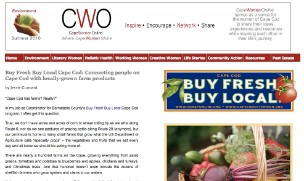Article - Where to find locally grown farm products, CapeWomenOnline.com (550 words)
While I was Program Coordinator for Buy Fresh Buy Local Cape Cod, I wrote articles to promote the program's goals and inform the public about the benefits and how-to's of buying locally grown products. Here's one such piece for Cape Women Online.
Buy Fresh Buy Local Cape Cod: Connecting people on Cape Cod with locally grown farm products
“Cape Cod has farms? Really?”
In my job as Coordinator for Barnstable County’s Buy Fresh Buy Local Cape Cod program, I get this question a lot.
True, we don’t have acres and acres of corn or wheat rolling by as we whiz along Route 6, nor do we see pastures of grazing cattle along Route 28 (anymore), but our peninsula is home to many small farms that grow what the US Department of Agriculture calls “specialty crops” – the vegetables and fruits that we eat every day and all know we should be eating more of.
There are nearly a hundred farms on the Cape, growing everything from salad greens, tomatoes and potatoes to blueberries and apples, chickens and turkeys, and Christmas trees. And that hundred doesn’t even include the dozens of shellfish farmers who grow oysters and clams in our waters.
Unless you’ve been under a rock, you’ll have noticed that the interest and demand for locally-grown food has increased both nationwide and locally. The number of farmers’ markets here on the Cape has grown to almost a dozen from just four a few years ago, and CSA (that’s Community Supported Agriculture) programs are popping up all over the region.
Buy Fresh Buy Local Cape Cod started in 2008 as a program of the Cape Cod Cooperative Extension, and our mission is to make it easier for people on the Cape to find locally grown farm products from land and sea.
Tips you can use right now to find fresh and tasty Cape-grown products:
* Use the Online Farm Guide to locate the farms and farm stands in your area. Using your zip code, you can search for specific crops, or just get a list of the farms close to you. It’s a good idea to call ahead to make sure that visiting the farm is okay and that they indeed have what you’re looking for.
* Identify the farmers’ markets close to your home or workplace and make an appointment with yourself to go. Some markets do take place during work hours on weekdays, but there just aren’t enough farmers for every community to have a Saturday market! Take along a tote bag or two, and it’s helpful to bring cash in small bills - the vendors will thank you!
* Sign up for the BFBL Cape Cod email newsletter. Once a month you’ll receive updates about what’s growing on the Cape, where you can find it, and what great farm- and food-related events are going on Cape-wide.
* Pick up a copy of Edible Cape Cod magazine, dedicated solely to stories and information about Cape Cod farms, seafood, restaurants, food history, and more.
* Listen to the Local Food Report, or visit local food blogs like diaryofalocavore.com and starvingofftheland.com . They’re great sources of up-to-the-moment information about what’s growing now on the Cape and what to do with it.
* And of course, visit www.buyfreshbuylocalcapecod.org to keep up with the latest information about Cape-grown products from both land and sea! Here’s to a wonderful summer of eating locally!
